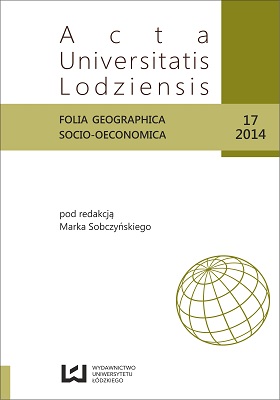Social planning and European contact areas: political geography in place
DOI:
https://doi.org/10.18778/1508-1117.17.02Keywords:
spatial planning, spatial integration, contact areasAbstract
The article deals with the issue of planning social and spatial integration in the so-called contact areas, where different political and cultural units meet and interlace. The study of such areas copes both with the persistent and immanent forms of territoriality in human beings and increasing quests for functional social, economic and spatial (re)integration. Both trends lead towards a multi-level and often contradictory relationship between different territories and borders, which emerge from the simultaneously developing processes of social and spatial convergence and divergence. For this reason, both theory and practice of political geography are permanently challenged by shifting policies of integration and/or separation, and social and spatial planning in European multicultural and border regions appears to be a difficult, almost Sisyphean task. Yet, it is central to the creation of more stable opportunities for both coexistence and development. This article provides a review of author’s considerations of political geographical transformations and issues related to European contact areas in the pre-modern, modern and post-modern period, with special emphasis on minorities and cross-border cooperation, suggesting to promote an integrative and multilevel approach that could somehow replace the classic "national" policies in relation to border areas development and minority protection.
References
Armstrong W., Anderson J. (eds.), 2007, Geopolitics of European Union Enlargement, Abingdon, Routledge.
Google Scholar
DOI: https://doi.org/10.4324/9780203448984
Blatter J.K., 2003, Debordering the world of states: toward a multi-level system in Europe and a multi-polity system in North America? Insights from border regions, [w:] Brenner N. et al. (ed.), State/Space – A Reader, Oxford, Blackwell, s. 185–207.
Google Scholar
DOI: https://doi.org/10.1002/9780470755686.ch11
Bufon M., 1999, Problematika teritorialnosti v politični in kulturni geografiji, „Geografski vestnik”, 71, Ljubljana, s. 91–103.
Google Scholar
Bufon M., 2001, From geopolitics to political geography: the new European challenge, [w:] Antonsich M. et al. (ed.), Europe between Political Geography and Geopolitics, Vol. 1, Roma, Societa’ Geografica Italiana, s. 335–346.
Google Scholar
Bufon M., 2003, Minorities, regional transformation and integration in borderlands: a case study, Annales, Series historia et sociologia, 13(1), Koper, s. 1–8.
Google Scholar
Bufon M., 2004, Med teritorialnostjo in globalnostjo, Koper, Annales.
Google Scholar
Bufon M., 2006a, Between social and spatial convergence and divergence: an exploration into the political geography of European contact areas, „GeoJournal”, 66(4), Dordrecht, s. 341–352.
Google Scholar
DOI: https://doi.org/10.1007/s10708-006-9008-1
Bufon M., 2006b, Geography of border landscapes, borderlands and euroregions in the enlarged EU, „Rivista Geografica Italiana”, 113(1), Firenze, s. 47–72.
Google Scholar
Bufon M., 2010, Planning integration in European areas of social and cultural contact: a Sysiphean task?, Treaties and Documents – „Journal of Ethnic Studies”, 62, Ljubljana, s. 74–90.
Google Scholar
Bufon M., 2011, Cross-border policies and spatial and social integration: between challenges and problems, „European Spatial Research Policy”, 18(2), Łódź, s. 29– 45.
Google Scholar
DOI: https://doi.org/10.2478/v10105-011-0011-2
Bufon M., 2013, It is possible to “measure” the intensity of cross-border cohesion? A case study of Slovene border areas, Annales, 23(1), Koper, s. 165–176.
Google Scholar
Bufon M., 2014, Spatial and social (re)integration of border and multicultural regions: creating unity in diversity?, [w:] Bufon M., Minghi J., Paasi A. (eds.), The New European Frontiers – Social and Spatial (Re)Integration Issues in Multicultural and Border Regions, Newcastle upon Tyne, Cambridge Scholars Publishing, s. 2–23.
Google Scholar
Bufon M. et al. (eds.), 2014, The New European Frontiers – Social and Spatial (Re)Integration Issues in Multicultural and Border Regions, Newcastle upon Tyne, Cambridge Scholars Publishing.
Google Scholar
Calhoun C., 2003, The democratic integration of Europe, [w:] Berezin M. in Schain M. (ed.), Europe without Borders, Baltimore, The Johns Hopkins University Press, s. 243–274.
Google Scholar
Caporaso J.A., 1996, The European Union and forms of state: Westphalian, regulatory or post-modern?, „Journal of Common Market Studies”, 34(1), s. 29–51.
Google Scholar
DOI: https://doi.org/10.1111/j.1468-5965.1996.tb00559.x
Casey E.S., 1997, The Fate of Place: A Philosophical History, Berkeley, University of California Press.
Google Scholar
Castles S. in Miller M.J., 2003, The Age of Migrations (Third edition), New York, The Guilford Press.
Google Scholar
Entrikin J.N., 2003, Political community, identity, and cosmopolitan place, [w:] Berezin M. in Schain M. (ed.), Europe without Borders, Baltimore, The Johns Hopkins University Press, s. 51–85.
Google Scholar
Held D. et al., 1999, Global Transformations: Politics, Economics and Culture, Oxford, Polity Press.
Google Scholar
DOI: https://doi.org/10.1057/9780333981689_2
Keating M., 1996, The invention of regions: political restructuring and territorial government in Western Europe, Working paper for ARENA (Advanced Research on the Europeanisation of the Nation-state).
Google Scholar
Paasi A., 2002, Bounded spaces in the mobile world-deconstructing “regional identity”, TESG 93, Utrecht, s. 137–148.
Google Scholar
DOI: https://doi.org/10.1111/1467-9663.00190
Poulantzas N., 1978, State, Power, Socialism, London, New Left Books.
Google Scholar
Sack R.D., 1980, Conceptions of Space in Social Thought, London, Macmillan.
Google Scholar
DOI: https://doi.org/10.1007/978-1-349-16433-2
Smith A.D., 1995, Nations and Nationalism in a Global Era, Cambridge, Polity Press.
Google Scholar
Williams C.H., 1997, Territory, identity and language, [w:] Keating M. in Loughlin J. (ed.), The Political Economy of Regionalism, London, Frank Cass, s. 112–138.
Google Scholar
Williams C.H., 2013, Minority Language Promotion, Protection and Regulation – The Mask of Piety, Basingstoke, Palgrave Macmillan.
Google Scholar
DOI: https://doi.org/10.1057/9781137000842
Downloads
Published
How to Cite
Issue
Section
License

This work is licensed under a Creative Commons Attribution-NonCommercial-NoDerivatives 4.0 International License.








